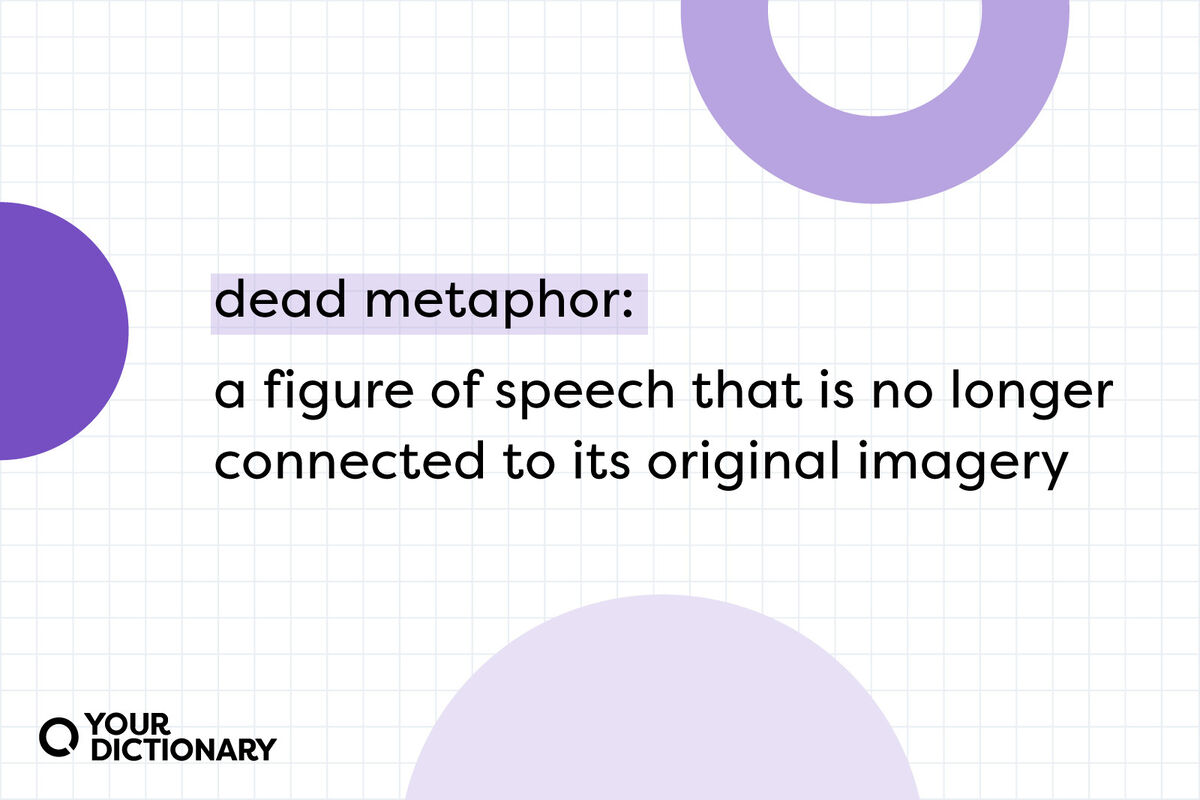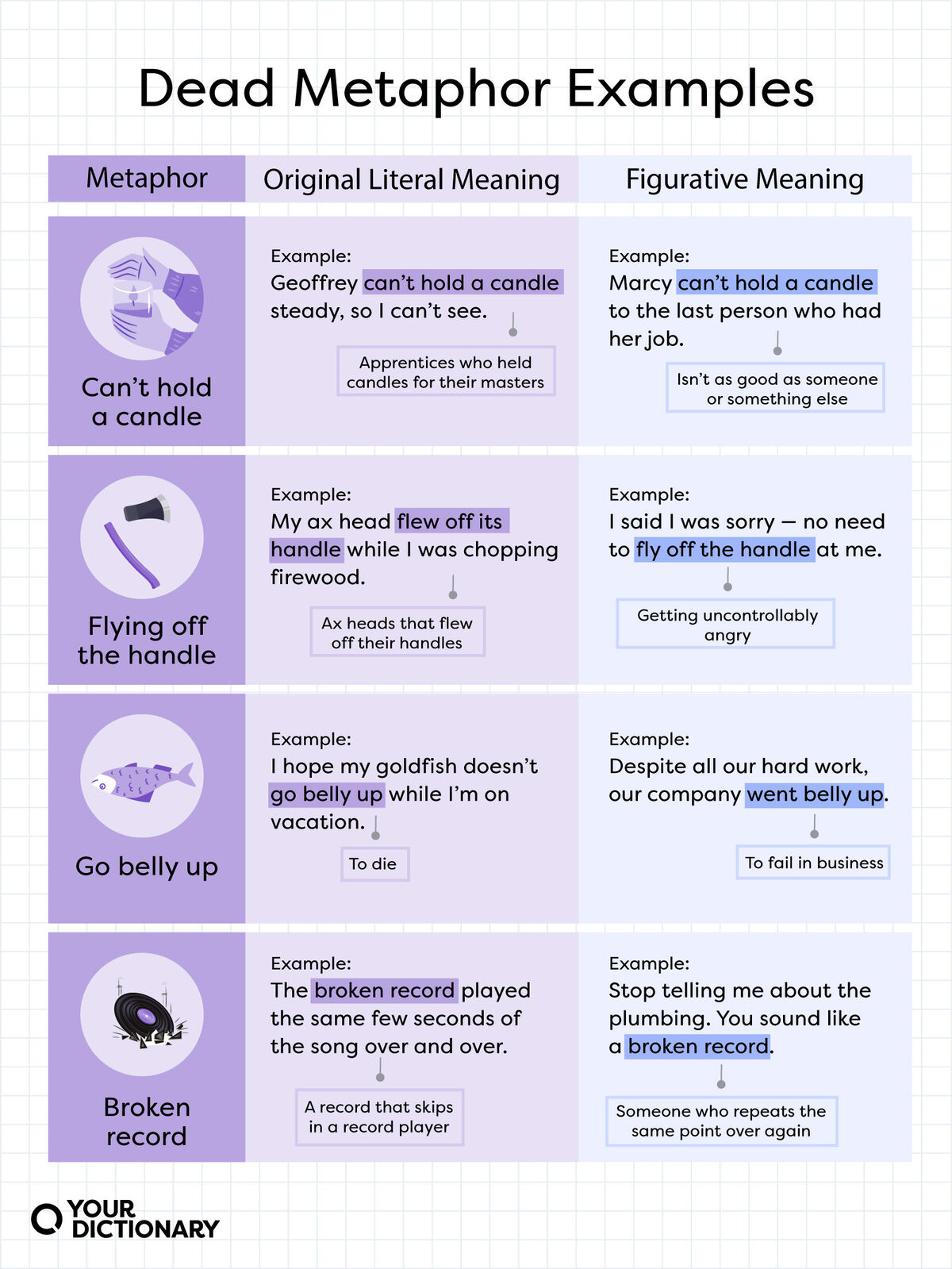
Why do we say leg of a trip or body of an essay, when neither trips nor essays have body parts? Why do we call “the day a thing is due” a deadline when no one’s going to die if your homework is a day late? Many English expressions are so common that we don’t even think about what they mean anymore. We call these dead metaphors, and they weren’t always so wacky — in fact, they used to make perfect sense.
What Is a Dead Metaphor?
A dead metaphor is a figure of speech that is no longer connected to its original imagery. Also known as a frozen or historical metaphor, a dead metaphor is such an old expression that, unlike a regular metaphor, you have no idea what it’s comparing — even if you know exactly what it means. If you think too long about a dead metaphor, you may find yourself even more confused about what it means.
For example, if you call someone a “laughing stock,” you mean that they are acting in a way that deserves ridicule. You don’t need to know about the medieval punishment that locks someone in the stocks, leaving them open to public taunting — even though that’s exactly where laughing stock comes from.
Dead Metaphor Examples
There are more dead metaphors in your vocabulary than you think. Have you ever wondered what the idiomatic expressions put a sock in it or hold your horses actually mean? (Admit it: You have.)

Batten Down the Hatches
Originally a nautical term meant to secure a ship’s hatches in preparation for a storm, the modern idiom is more about preparing for an upcoming crisis or challenge.
Example: Batten down the hatches; The boss is coming.
Body of an Essay
Writers used to compare the structure of an essay to that of human anatomy, and so the “body” of an essay is the main part of the essay. Most people don’t think of the human form when talking about the body of an essay.
Example: Be sure to add evidence to the body of your essay.
Brand New
Brand new doesn’t come from the concept of a brand name. This dead metaphor originated from a brand or firebrand, a piece of wood taken fresh from the fire. The imagery of pulling a fresh idea or new belonging straight from a fire may be lost to time, but it’s still a great mental image.
Example: You’re the proud owner of a brand new car!
Can’t Hold a Candle
Today, if you say that you can’t hold a candle to someone, you’re saying that you are vastly inferior to that person in terms of skill or talent. The original metaphor referred to apprentices who used to hold candles up for their masters to see what they were working on. If you’re not even good enough to hold up the candle, you are nowhere near in the same league.
Example: Marcy can’t hold a candle to the last person who had her job.
Champing at the Bit
Sometimes written incorrectly as “chomping at the bit,” this equestrian idiom refers to the “bit” that goes in a horse’s mouth for horse racing. An unsettled, impatient, or anxious horse may chew on the bit before a race, though few people would picture a gnawing horse when using this expression.
Example: The kids are champing at the bit to see the new superhero movie.
Curb Your Spending
The common idiom curb your spending means to check or restrain spending. It’s derived from the strap, called a curb, that passes under the lower jaw of a horse and works with the bit to restrain the horse.
Example: If you want to have enough money for your vacation, you’re going to have to curb your spending.
Deadline
While everyone understands this to mean when something is due, a deadline originally referred to the line around the perimeter of a prison, wherein a prisoner would be shot if they went beyond it.
Example: The deadline for your book report is Friday at noon.
Flying Off the Handle
When someone is flying off the handle, it means they have lost their sense of self-control, like an ax blade head flung off its handle (its original meaning). Today, the metaphor describes someone who has lost their temper.
Example: I said I was sorry — no need to fly off the handle at me.
Go Belly Up
A business that has gone belly up has failed and closed for good. The term derives from what happens when a fish dies, turning belly up and floating to the top.
Example: Despite all our hard work, our company went belly up.
Groundbreaking
While a shovel digging into the earth is literally breaking the ground to start a construction project, the dead metaphor is also used in a figurative sense to describe something that’s never been done before (a groundbreaking idea). We don’t always picture the imagery of digging into soil when we hear this phrase.
Example: In a groundbreaking research study, scientists discovered how effective antibiotics can really be.
Hold Your Horses
Figuratively, hold your horses means “Stop” or “Wait.” Though you may not immediately think of pulling on the reins of a team of horses (making them stop) when you use this phrase, that’s where it comes from.
Example: Hold your horses — we need more time to think about this decision.
Leg of a Trip
While this might sound like it relates back to the human body too, the original term comes from the context of sailing. Each “leg” was a run made by a ship on a single tack. Now legs of a trip are more commonly applied to flights and other parts of a journey.
Example: After this last leg of the trip, we’ll finally be at the campsite.
Put a Sock in It
An informal way of saying “Please stop talking” (or, less politely, “Shut up”), put a sock in it comes from the early 20th century. It refers to the practice of quieting the volume of a gramophone with a balled-up sock, and soon after, using the same process on a noisy person’s mouth. It’s not literal anymore, luckily.
Example: Put a sock in it! I’m trying to study!
Time Is Running Out
When you say time is running out, it means that you almost don’t have enough time to do the thing you need to do. The original metaphor referred to the sand in an hourglass, so time (as measured by the sand) would literally run out of the top bulb into the bottom.
Example: You’d better get started on your homework; time is running out.
21st-Century Dead Metaphors
If these metaphors seem too old-timey for you, we’ve got bad news: Some dead metaphors are more recent than you may think.
Broken Record
When someone’s acting like a broken record, they’re repeating the same thing over and over. Unless they were born in the second half of the 20th century, they might not know that a broken record was a real thing. On a record player, a broken record would skip and repeat the same second of audio over again.
Example: Stop telling me about the plumbing. You sound like a broken record.
Carbon Copy
“You’re a carbon copy of your mother!” means that you look and/or act just like your mother. But carbon copy meant something much different before the days of digital documents. When you wrote on carbon paper, your writing went through several layers, creating carbon copies that were just like the top layer of paper.
Example: Although the twins looked like carbon copies, they acted very differently.
Hang Up the Phone
When’s the last time you hung up a phone? Not pressed the circle on your smartphone — when did you last literally hang a phone up on a wall? Regardless of your landline experience, hanging up the phone (or hang up on someone) is still an idiomatic way to say “end a phone call.”
Example: I can’t believe you hung up on me in the middle of a sentence!
Stay Tuned
If you want someone to stick around for an upcoming announcement, you may say “Stay tuned!” The phrase goes back to 20th-century radio and television stations that encouraged their viewers to stay tuned — literally, to the channel their radios or televisions were tuned to. Nowadays, viewers are much more familiar with streaming their favorite programs than tuning in to a live broadcast.
Examples: Stay tuned for important news about our wedding!
Video Footage
Have you ever wondered why we describe video as footage? Early filmmakers used reels of film to create their work, which were measured by the foot — hence, footage. Think about that connection the next time you hear about video footage shot from a smartphone and transferred to the cloud.
Example: The police found the suspect by watching video footage from the store’s security camera.
Step Into the Metaphor-Verse
Metaphors are so ingrained in our language that stopping to think about them often takes too long. Just like with implied metaphors, which state one part of a metaphor without mentioning the other, dead metaphors are an important part of being truly fluent in English. (And they’re not nearly as spooky as they sound.)